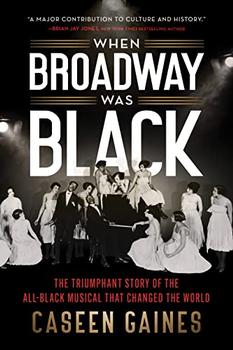Summary | Excerpt | Reading Guide | Reviews | Beyond the Book | Read-Alikes | Genres & Themes | Author Bio

The Triumphant Story of the All-Black Musical that Changed the World (aka Footnotes)
by Caseen GainesThis article relates to When Broadway Was Black
 In Footnotes*, Caseen Gaines explores the production of Shuffle Along, the first all-Black musical to become a runaway success on Broadway. The show's appeal and popularity are credited in part to the talents of songwriting team Noble Sissle and Eubie Blake, who had a history of collaborating that predated their exceptional work on Shuffle Along.
In Footnotes*, Caseen Gaines explores the production of Shuffle Along, the first all-Black musical to become a runaway success on Broadway. The show's appeal and popularity are credited in part to the talents of songwriting team Noble Sissle and Eubie Blake, who had a history of collaborating that predated their exceptional work on Shuffle Along.
Noble Sissle was born in Indianapolis, Indiana in 1889. He was inspired to pursue music by his father, who was a minister and church organist. After getting his start performing vaudeville as a young man, Sissle moved to Baltimore in 1915 and joined a musical group called Joe Porter's Famous Dixie Serenaders.
Eubie Blake was a Baltimore native, born James Hubert Blake in the city in 1887. He started taking organ lessons at age seven, and reportedly played in a brothel at age 15 (without parental knowledge or permission). Blake also joined Joe Porter's Serenaders in 1915, and shortly thereafter he and Sissle composed their first song together, "It's All Your Fault." They brought the song to the singer Sophie Tucker, who bought it for $200.
Sissle enlisted in the army in 1917 after the United States entered World War I, joining the 369th Infantry, known as the Harlem Hellfighters. Sissle and fellow musician James Reese Europe organized a marching band, and their music is believed to have introduced the American style of jazz to many parts of France during the war.
After the war, Blake and Sissle formed a group called the Dixie Duo and performed on the vaudeville circuit. In 1920, the pair met Flournoy Miller and Aubrey Lyles. These two were also songwriters and performers, and the four began working on the musical Shuffle Along shortly thereafter. The show premiered in 1921 and was a tremendous success. Interestingly, Blake and Sissle resisted performing in blackface while working in vaudeville, despite it being a common feature of this performance genre. Shuffle Along, however, was performed in blackface. In a 1973 radio interview, Sissle explained, "When we put Shuffle Along, on Broadway, we put negroes back to work again...People said that we had an Uncle Tom show, because it was cork and they distorted the English language. But it was permissible in those days." Cork is another term for blackface, as in early iterations performers used burnt cork to darken their appearance.
Noble Sissle and Eubie Blake both went on to do a number of extraordinary things. Sissle produced and starred in two additional Broadway shows, Dixie on Parade and a 1933 revival of Shuffle Along. He was one of the founding members of the Negro Actors' Guild, serving as the organization's first president in 1937. In 1953, he performed at President Eisenhower's inauguration, and throughout the '50s he had a radio show, which he used to highlight the work of other Black music artists. Sissle died in 1975 at age 86.
During World War II, Blake was a bandleader for the United Services Organization (an American nonprofit group, generally known as the USO, that seeks to be a "home away from home" for U.S. Armed Forces personnel by providing live entertainment to troops and their families wherever they are posted). Upon returning to the United States, he attended New York University, studying music. In the 1970s, he performed on The Tonight Show Starring Johnny Carson and The Merv Griffin Show multiple times. A hit Broadway show called Eubie! showcased the artist's greatest hits, running from 1978-79. He was awarded the Presidential Medal of Freedom by President Reagan in 1981. Eubie Blake died in 1983 at age 96. The Eubie Blake Cultural Arts Center in Baltimore honors his legacy by showcasing Black artists and offering art and cultural programs to young people.
Below, you can see a clip of Sissle and Blake performing "Snappy Songs Number 2" in 1923. The sound quality is poor due to the technology used and the aging process, but it gives you an idea of what their performances were like.
Note:
Note: When first published in hardcover in 2021, this book was titled Footnotes: The Black Artists Who Rewrote the Rules of the Great White Way. In paperback, it was renamed, When Broadway Was Black:The Triumphant Story of the All-Black Musical that Changed the World.
Noble Sissel (left) and Eubie Blake (right), courtesy of Travalanche
Filed under People, Eras & Events
![]() This "beyond the book article" relates to When Broadway Was Black. It originally ran in August 2021 and has been updated for the
February 2023 paperback edition.
Go to magazine.
This "beyond the book article" relates to When Broadway Was Black. It originally ran in August 2021 and has been updated for the
February 2023 paperback edition.
Go to magazine.




Sometimes I think we're alone. Sometimes I think we're not. In either case, the thought is staggering.
Click Here to find out who said this, as well as discovering other famous literary quotes!
Your guide toexceptional books
BookBrowse seeks out and recommends the best in contemporary fiction and nonfiction—books that not only engage and entertain but also deepen our understanding of ourselves and the world around us.